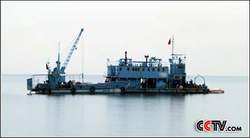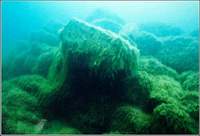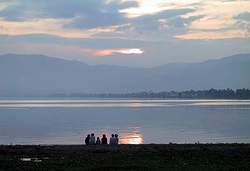 People in the Fuxian Lake area of southwest China's Yunnan Province are environmentally conscious and have taken preliminary measures to protect their precious natural resource. People in the Fuxian Lake area of southwest China's Yunnan Province are environmentally conscious and have taken preliminary measures to protect their precious natural resource.
Fuxian Lake is famous for its beautiful scenery and its Kanglang Fish. The lake once again was in the spotlight in 2001 when an ancient group of buildings was found underwater. Tourism is developing rapidly as many people are curious about this so-called sunken kingdom. But is tourism the ultimate goal for development? What is happening in this legendary place? China Today will take you there for a closer look.
 With pollution gradually becoming a worldwide problem, nowhere on Earth is exempt from the consequences, not even a fairytale place like Fuxian Lake. To address the problems that had developed there, 68 restaurants around the lake were shut down. Ten hotels without wastewater treatment facilities also were closed. And 386 farm families were relocated with 20 hectares of farmland returned to the lake. These changes have affected many of the local residents, but they know that this will benefit not only themselves but also generations to come.
With pollution gradually becoming a worldwide problem, nowhere on Earth is exempt from the consequences, not even a fairytale place like Fuxian Lake. To address the problems that had developed there, 68 restaurants around the lake were shut down. Ten hotels without wastewater treatment facilities also were closed. And 386 farm families were relocated with 20 hectares of farmland returned to the lake. These changes have affected many of the local residents, but they know that this will benefit not only themselves but also generations to come.
The discovery of benthic fossils and trilobites on Maotianshan Mountain near Fuxian Lake in 1984 revealed the early world of the Cambrian Period that has been asleep for 530 million years. In 2001, more than a decade after the discovery, China Central Television broadcast live the whole process of the inspection work on the underwater architectural complex in Fuxian Lake. This event once again brought Fuxian Lake into the spotlight. This beautiful yet mysterious lake on the plateau quickly became a tourist resort.
Fuxian Lake is located in Yuxi City, rising 1,720 meters above sea level and encompassing 212 square kilometers of land. The deepest part of the lake descends 157 meters, the second deepest freshwater lake in China. Beautiful scenery, spring-like seasons and many cultural relic sites around the lake are combined with a unique fishing culture to present one version of paradise. But the worldwide problem of pollution has been encroaching on this pearl of the plateau. Mo Shaozhou, Local Official of Fuxian Lake Area, said: “Fuxian Lake's environment began to change in 1991. The water transparency was 8.7 meters then and 4.95 meters according to inspection data in 2001, a decrease of more than three meters at a rate of 30 centimeters a year. ”
 Fuxian Lake is semi-closed on the plateau, with its northern part both broad and deep. The southern part is straight and low, while the middle stretch is long and narrow, shaped like a calabash. The lake has a large water storage capacity with a relatively small amount of inflow and outflow. It takes a long time to recycle the water, which makes for fragile ecological conditions. If not properly protected, this so-called "fairy lake" that the Yunnan people are so proud of could soon become a dead lake. Guo Zhenren, Deputy Director of Environmental Protection Bureau, Yunnan Province, said: “Fuxian Lake is the third largest of nine large lakes in Yunnan. As it runs 157 meters in the deepest part with an average depth of 87 meters and a small amount of water exchange, the water change period takes 169 years. Once polluted, it is very difficult to recover. That's why we have put great emphasis on the problem and regarded it as the focus of our protection. ”
Fuxian Lake is semi-closed on the plateau, with its northern part both broad and deep. The southern part is straight and low, while the middle stretch is long and narrow, shaped like a calabash. The lake has a large water storage capacity with a relatively small amount of inflow and outflow. It takes a long time to recycle the water, which makes for fragile ecological conditions. If not properly protected, this so-called "fairy lake" that the Yunnan people are so proud of could soon become a dead lake. Guo Zhenren, Deputy Director of Environmental Protection Bureau, Yunnan Province, said: “Fuxian Lake is the third largest of nine large lakes in Yunnan. As it runs 157 meters in the deepest part with an average depth of 87 meters and a small amount of water exchange, the water change period takes 169 years. Once polluted, it is very difficult to recover. That's why we have put great emphasis on the problem and regarded it as the focus of our protection. ”
These billboards scattered around the lake have been set up by the local government to publicize environmental protection, reminding people to love their surroundings and sustain the ecology. And nearby the billboards is Fuxian Lake that calls for special care from people. In order not to follow the misguided policy of "pollute first and then treat,” the Yuxi city government set up a management committee to take charge of developing the protection work for the lake area. Guo Kaitang, Local Official of Fuxian Lake Area, said: “We have taken measures to return ponds, houses and farmland to the lake and forest basically to purify the environment and protect the ecological system around the lake with an aim to offer highly valuable resources for development. ”
Fuxian Lake is located in the center of the Dianzhong Basin and spans more than three counties in Yuxi City. It runs through 248 natural villages that have a population of 140,000. And the catchment area includes 4 million tons of domestic sewage and 600,000 tons of night soil and dung every year. With more than 6,000 hectares of farmland in the drainage area, about 2,500 tons of nitrogen-based fertilizer and 1,000 tons of phosphate-based fertilizer run off into the lake. All these are great threats to the ecological balance in the lake area. To effectively control these pollutants, the local government is encouraging nearby farmers to develop eco-agriculture, build eco-villages and readjust their planting structure. Many artificial wetlands have been created to restore and purify the environment. Huge sums of money have been invested in building three sewage treatment plants. Mao Shaozhou, Local Official of Fuxian Lake Area, said: “All three large sewage treatment plants along the lake are adopting bio-technology in dealing with sewage problems. About 13,000 tons of wastewater is treated every day, that's to say, around 4 million tons less wastewater will enter the lake every year. ”
 Tourism at Fuxian Lake has been developing at a rapid pace in recent years. But buildings took up much of the area so that ecological conditions were worsening. The local government committed itself to tearing down some of the tourist facilities to restore the natural environment.
Tourism at Fuxian Lake has been developing at a rapid pace in recent years. But buildings took up much of the area so that ecological conditions were worsening. The local government committed itself to tearing down some of the tourist facilities to restore the natural environment.
A tourist park with an investment of 30 million RMB used to be on this site. It ran quite well and had adopted corresponding environmental protection measures, but was torn down less than a year after it opened for business. Face with the wreckage, Xu Shide, the president of Wanhai Company, said: “I spent lots of time and energy on the buildings day-in and day-out. Township enterprises such as ours cannot stretch too long, or you will just lose. The park was built up in six months and put to use with good profits. It is true that I grew attached to the park as I have invested so much in it. We have actually contributed a lot in protecting Fuxian Lake.”
The rise of pollution also endangered the fish. People were catching a special species called Kanglang Fish in the lake. The Kanglang Fish is 10 centimeters long, active and reported to have tender meat with soft bones and very tasty. As the fish has a unique lifestyle, the local people also use a unique method for catching and cooking the fish. Many people will just swarm to this place during the fishing season for the fame of the fish and the unique fishing culture. In recent years, however, fewer and fewer people eat the fish not because they have had enough, but because the price of the fish has soared to 2,000-to-3,000 RMB per kilogram. Why has the price skyrocketed? According to a local fisherman, ten years ago, I could catch about 10 tons of the Kanglang Fish every year; eight years ago, eight or nine tons; five or six years ago, only five or six tons. Now I can catch only several hundred kilograms.
 The scene was spectacular in the past when people were catching large quantities of the Kanglang Fish. These used to be well-known fishing holes, but the scene is much calmer today. Now, the fishing facilities are just set aside and exposed to the elements for most of the year.
The scene was spectacular in the past when people were catching large quantities of the Kanglang Fish. These used to be well-known fishing holes, but the scene is much calmer today. Now, the fishing facilities are just set aside and exposed to the elements for most of the year.
To protect fish resources in the lake and check over-fishing, the Fuxian Lake Management Committee reduced the time for fishing from four times per year to twice a year in 1998. The number of days for fishing were also reduced from 15 to fewer than 10 days. Wang Tinghui, Local Official of Fuxian Lake Area, said: “The Kanglang Fish has become rare because of water pollution. It has actually become an engendered species. In the last two or three years, the government has invested huge sums of money and manpower into restoring this species of fish. We will have to wait for years before we can see any results. The fishery department is patrolling the lake day and night and has tightened controls over the local fishermen.”
In the mountains south of Fuxian Lake is a two-kilometer-long river. A "Fish Boundary" stands in the river. It is said that Kanglang Fish from Fuxian Lake and bullhead fish from Xingyun Lake in the upper reaches would return when the waters touch the stone. Hence the wonder of "two lakes join but fishes never communicate." Fish could remain isolated even though the waters are connected. Poor-quality water rated at the fourth grade from Xingyun Lake to the Fuxian Lake is also causing serious trouble. Mao Shaozhou, Local Official of Fuxian Lake Area, said: “More than 40 million cubic meters of the fourth-grade water and water of inferior quality in Xingyun Lake is running into Fuxian Lake every year. This accounts for a little less than 10 percent of all the pollutants. We are launching a project to divert the water in Xingyun Lake through a tunnel and an open channel to the upper reaches of the Gongfeng Reservoir in Yuxi City. Twenty-to-40 million cubic meters of water will be diverted every year and some of the first-grade water in Fuxian Lake will be used to replace the fourth-grade water in Xingyun Lake to reduce the pollutants.”
The water diversion project is still in the bidding process, but is encouraging for many people. Because that means protection of Fuxian Lake is being extended even wider. And the lake of clean water will play a more positive role. Environmental protection workers have expressed gratification that the fishing season for Kanglang Fish was re-opened in 2002. Guo Zhenren, Deputy Director of Environmental Protection Bureau, Yunnan Province, said: “It is wonderful that Fuxian Lake can still maintain first-grade water; this is a great success. We learned a lesson from Dianchi Lake. All related departments and government at all levels as well as ordinary people are aware of the problem. And timely measures have been taken to effectively avoid pollution in Fuxian Lake.”
Background
Fuxian Lake is five kilometers from Chenjiang county and 63 kilometers from Kunming City in Yunnan Province. It is the second deepest freshwater lake in China. It has a water area of 212 square kilometers, and its banks run for 90 kilometers. The average depth is 87 meters, and is 155 meters at its deepest. The volume of water is 18.5 billion cubic meters.
Editor:Wang Yin
|